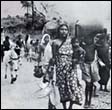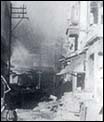'Fainting women were brought to the flag stand to recuperate; the streets were blotted out by humans'
 At the climax of the morning ceremony, when the national flag broke over the Assembly building, I felt a tremendous stir both
inside the House, which I left at that moment, and in the packed
grounds outside. This was the visible symbol of Independence,
and it made a profound impression on the people who watched it
unfurl. This particular flag means a great deal to many Indians
because, with small modifications, it is the banner under which
the Congress party whipped up this colonial people to a firm demand
for self-rule.
At the climax of the morning ceremony, when the national flag broke over the Assembly building, I felt a tremendous stir both
inside the House, which I left at that moment, and in the packed
grounds outside. This was the visible symbol of Independence,
and it made a profound impression on the people who watched it
unfurl. This particular flag means a great deal to many Indians
because, with small modifications, it is the banner under which
the Congress party whipped up this colonial people to a firm demand
for self-rule.
In the afternoon, when the day's big story had been filed, Mildred
and I made our way to what was to be a military parade and flag-raising
by Nehru for the public.
The arrangements committee, as I remarked earlier, had planned
for a crowd of 25,000 people in the spacious Kingsway Plaza at
Princes' Park. From the time we left Old Delhi, 7 miles away,
however, we passed people trooping to the display in overcrowded
buses, trucks and horse tongas or on foot. The four-lane road
was choked several blocks before we reached Kingsway, and as we
walked closer to the flagstand the streets were blotted out by
humans.
As a monsoon storm seemed about to break, we hung back for a while.
But soon, holding the neat blue cards showing our specific reserved
seat numbers, we plunged into the sea of bodies. At first it was
no worse than trying to get into a college stadium at the moment
a football crowd is leaving it.
Then the crowd thickened. When we reached the reserved seat section,
we found two and three people standing on a single chair. Everyone
held everyone else up, so that the pressure was toward the aisle
along which we were trying to make our way. At one place two young
men were straddling the aisle, with a toe on a chair on either
side. Still we pressed ahead, as I hoped we could find a free
place near the flag pole.
We bucked a stream of people who were already trying to break
through the crowd to the rear. Finally we stalled. It was impossible
to push farther ahead. Yet the crowd behind us prevented our returning.
A little boy near by cried with fright. His father tried to protect
him. Three women, apparently dizzy, strove to find an open space
for themselves. There was no fresh air. From behind people pushed
forward, while in the front police and officials tried to push
the crows back.
Nehru himself, in his accustomed tempestuous manner, plunged into
the struggling mob in an effort to make the front ranks sit down.
He penetrated for some distance, led Pamela Mountbatten, who had
been caught in the crush out by the hand, and then had to be rescued
himself.
Lord Mountbatten picked up a child who seemed in danger of being
overrun. Fainting women were brought to the flagstand to recuperate.
Extra hazards were provided by a few intoxicated bravados who
were throwing their weight around. While straining against the
tide to keep from being overrun, our main concern was possible
panic.
As part of the amazing mass change of heart, there was not the
slightest indication of ugly moods. There were no other white
faces in sight. Yet neighbors helping to brace me smiled encouragingly
and tried to make an extra inch of space for Mildred. And as individuals
were thrust past us by the human pressure from behind, they apologised
for the bumps.
If there was ceremony to the hoisting of the flag, I missed it.
Fearing an incipient police thrust to control the mob, I was just
then trying to lead Mildred out across the chairs between the
aisles. The colours, I believe, were run up in a hurry to help
break the tension. Just as they flapped free, a rainbow appeared
in the sky, and when Lord Mountbatten pointed to it, the crowd
went happily wild. Then the exodus began. (I never did find out
what happened to the military parade. All we saw were the aircraft
that crossed in formation).
 There was hardly strength remaining to attend the reception in
the evening. But when we watched Lord and Lady Mountbatten and
Prime Minister Nehru shaking hands with the hundreds and hundreds
of people who walked through that line, we knew that those three
tired people counted the day a triumphant one.
There was hardly strength remaining to attend the reception in
the evening. But when we watched Lord and Lady Mountbatten and
Prime Minister Nehru shaking hands with the hundreds and hundreds
of people who walked through that line, we knew that those three
tired people counted the day a triumphant one.
Thus, then, Independence came to India.
Independence may solve few of the nearly overwhelming problems
facing the infant governments of India and Pakistan. But if even
a portion of the potential new energies are released and only
some of the tolerance and goodwill shown during the last week
remain, well-wishers of the country can be more hopeful than before.
Yours sincerely,
Phillips Talbot
Kind courtesy: New India Digest, a journal to promote a better understanding of modern India. Readers who wish to subscribe to New India Digest may write to India Digest Foundation, Sahaydri Sadan, Tilak Road, Pune 411030.
| 
